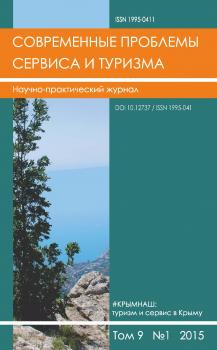Mobilising the economic potential of the intangible cultural heritage, using it as the tourist attractions is in modern con- ditions the basis for sustainable development of historical settlements and historic areas. Bolgar Historical and Archaeo- logical complex has passed a period of its formation and now is one of the largest and interesting conservation areas in the Russian Federation. Every year the tourist flow here is growing. Theatrical meeting in national traditions give a unique local flavor and are very popular among tourists. However, museum tourism product experiences a lack of ethnic component; and local population, irritated by mass tourist arrivals, is isolated from its formation. The difficulties, appearing as the result of searching the balance of market participants’ interests, are specific for the culture and tourism development in the whole world. Although the involvement of residents in local cultural projects is less expensive and more sustainable in the long term The problem of introduction of local population to the tourism development and the involvement of the intangible cultural heritage can be solved by the implementation of measures aimed at getting by the local population economic, social, cultural and other benefits. The article deals with the problem of introduction of local population in the processes of tourism development and the involvement of ethnic and cultural intangible heritage in tourist complex. The authors make conclusion about the possibilities of the combination of tangible and intangible components of heritage in Bolgar Historical and Archaeological complex as the prospects of its further development.
ethno-tourism, historical settlements, ethnic and cultural heritage, ethnic and cultural identity, Bolgar Historical and Archaeological complex.
1. Dyrtyk-ool A.O. 6th International Bolghar Forum. Novye issledovanija Tuvy [The New research of Tuva], 2014, No.4, pp. 158-164. (In Russ.).
2. Eagles P.F.J., McCool S.F., Haynes C.D. Sustainable Tourism in Protected Areas. Guidelines for Planning and Man- agement. Gland: IUCN, 2002. Vol.8. 180 p. (Russ. ed.: Igls P., MakKul S., Hajns K. Ustojchivyj turizm na ohranjaemyh prirodnyh territorijah. Rukovodstvo po planirovaniju i upravleniju. Мoscow: EkoCentr «Zapovedniki», 2006. Vol. 8. 188 с.). (In Russ.).
3. Kosinceva A.P. The open air museum as a space of ethnic culture presentation (the case of Tyumen Region Muse- um). Rjabininskie chtenija - 2011 [Ryabininsk reading - 2011]: Proceedings of the VI Conference on the Study and actualization of cultural heritage of the Russian North. Petrozavodsk: Karelian Research Centre of Russian Academy of Sciences, 2011, pp. 526-527. (In Russ.).
4. Kuryanova T.S. Ethnic aspect of intangible heritage: ways of preserving. Vestnik Tambovskogo universiteta. Serija: Gumanitarnye nauki [Tambov University Reports. Series: Humanities], 2012, No.362, pp. 87-90. (In Russ.).
5. Ljubichankovskij A.V. Analyzing the concept of «cultural heritage». Vestnik Orenburgskogo gosudarstvennogo uni- versiteta [Vestnik of the Orenburg State University], 2006, No.12, path 1, pp. 83-90. (In Russ.).
6. Timofeeva L.S. Reserve museums in cultural tourism. Trudy Sankt-Peterburgskogo gosudarstvennogo universiteta kul’tury i iskusstv [Proceedings of the St. Petersburg State University of Culture and Arts], 2015, vol.212, pp. 197-203. (In Russ.).
7. Shcherbakova Yu.N. The impact of globalization on the ethnic and cultural identity in modern society. Analitika kul’turologii [Analysis of Cultural Studies], 2011, No.3(21), pp. 138-140. (In Russ.).
8. Richards G., Wilson J. The impact of cultural events on city image: Rotterdam, cultural capital of Europe 2001. Urban Studies, 2004, vol.41, No.10, pp. 1931-1951. DOI:https://doi.org/10.1080/0042098042000256323





